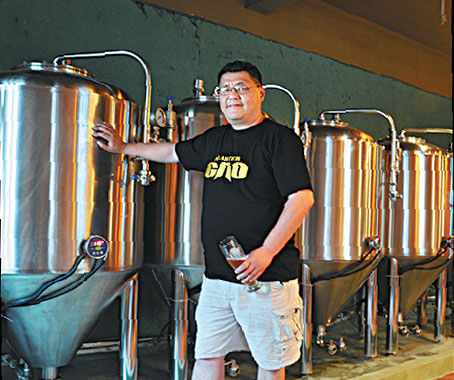Nanjing's king of hops
Updated: 2015-01-15 07:46
By Xu Lin(China Daily USA)
|
||||||||
A craft brewer has helped spread his own craving for specialty beers across China. Xu Lin reports.
Gao Yan, 46, never expected his love of craft beer to make him a pioneering brewer in a fast-growing market in China.
"The charm of craft beer is that it is very tasty, and you can change its flavor as you wish to fulfill your desire of creation and give you a sense of achievement," says Gao, the founder of Nanjing Craft Brewing Co.
He now has more than 20 categories of beer under his Master Gao brand. Each features typical Chinese elements in tastes and packaging. The current annual output is nearly 100 tons, which is equal to about 1 percent of that of a small beer factory, he says.
When he first started to make his own beer at home, he used some Chinese ingredients, such as ginger and dates, to do simple trials. Later, he developed more complicated beers with jasmine and Tibetan barley.
Last year, he developed Baby IPA and cooperated with a beer factory to produce bottled craft beer.
It's as sweet as oranges with a fine white foam as smooth as the skin of a baby. The illustrated label on the bottle sports a chubby infant holding a big carp in his arms, which is a common image for the Lunar New Year.
Gao plans to make a documentary next year, to record his adventures as he tours several Chinese cities to develop craft beers using local ingredients.
"Some imported beers have intense flavors, but my beers are specially brewed for Chinese, with balanced and mild flavors," he says.
His beers are sold both online and in stores via distributors all over the country.
While ordinary beers are one-dimensional and have no outstanding characteristics, he says, craft beers are diversified in flavors and cultures.
"Homebrewed beers are like homemade casual meals, and small factories are doing professional cooking, delivering the best dishes," he says.
Gao's beer-drinking buddy Yang Ping, 25, an office worker from Beijing, says: "Gao brews craft beer because he is really fond of it. He wants more people to share the drinks. He gets on very well with others in the craft-beer circles, too."
The Master Gao crew is a fixture at craft-beer festivals around the country.
Gao's love of beer goes back to the early 1990s, when he was working in the United States. He drank craft beer for the first time and fell in love with it instantly. He recalls the first sip as magical - like a fresh spray in the mouth.
He got a home-brewing kit from a friend who was moving to a new house, and he began to explore the possibilities.
He says it's not difficult for him to make delicious beer, and attributes his mindset and skill to his studies in the US, where he earned a Master of Science in chemistry.
"The secret is to drink more, learn more and share more," he says.
In 2007, he returned to his hometown, Nanjing, and was disappointed to find no craft beer on sale in the city.
He set up his own factory a year later.
"I can survive without beer. But where there is beer, there is hope," he jokes.
However, it was a challenge at first to educate customers. China's beer drinkers had no idea what craft beer is, and buying a domestic beer at import prices didn't make much sense to them. Even in Beijing, the market was slow to grow out of the expat community after Great Leap Brewing opened in a sleepy hutong in 2010. Today, mugs foaming with house-made beer are being raised all over the capital, including a newer, bigger and always-packed Great Leap pub in Dongcheng district.
Gao has grown with the Chinese craft-beer revolution, too. He says more than 200,000 beer-lovers - from painters to musicians to reporters - have quaffed his various brews. He has sold 160 tons of Baby IPA alone, he adds.
According to him, craft beers account for less than 1 percent in the Chinese beer market, and many are imported. China only started to import craft beers about seven or eight years ago, but he is confident about the potential of the Chinese market.
"The good news is that our factory is starting to make a profit this year. The development of craft beer in the whole country is going well," he says.
In 2011, he published the book Get Your Own Brew, the first how-to book in Chinese about home-brewing with many well-tested recipes, he claims. One can brew beers at home, with proper water, malt, hops and yeast - and equipment such as a grinding machine and a fermenter.
He says home brewing took off around the same year, noting that about 10,000 Chinese have made their own beers. Besides big cities, nearly every second-tier city has an association or club for local craft-beer fans.
Quoting a report from Euromonitor International Ltd, a London-based market intelligence firm, he says the number of imported craft beers increased by about 50 to 70 percent in 2012 in China, and small beer houses are blooming across the country.
A lot of them know Master Gao.
Contact the writer at xulin@chinadaily.com.cn
Mike Peters contributed to this story.
|
Gao Yan, founder of Nanjing Craft Brewing Co,has more than 20 categories of beer under his Master Gao brand. Each features typical Chinese elements in tastes and packaging. Photos Provided To China Daily |


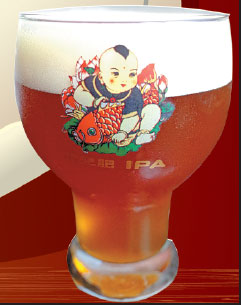
(China Daily USA 01/15/2015 page7)

 Best wedding snaps in 2014
Best wedding snaps in 2014
 Fancy sportscars premiere at Detroit auto show
Fancy sportscars premiere at Detroit auto show
 Looking hot in the cold
Looking hot in the cold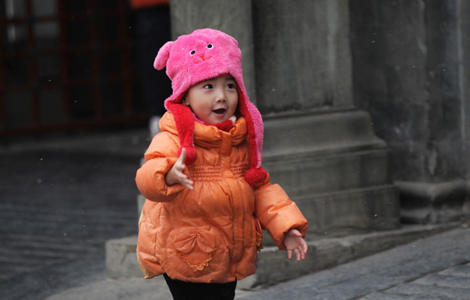
 Beijing sees first winter snow amid heavy smog
Beijing sees first winter snow amid heavy smog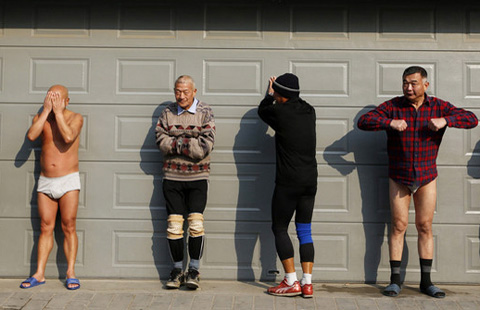
 Elderly swimmers see health benefits in freezing water
Elderly swimmers see health benefits in freezing water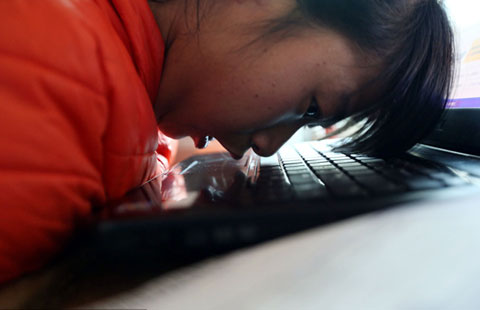
 Girl uses nose to run online store
Girl uses nose to run online store
 Pregnant cow winched from well by crane
Pregnant cow winched from well by crane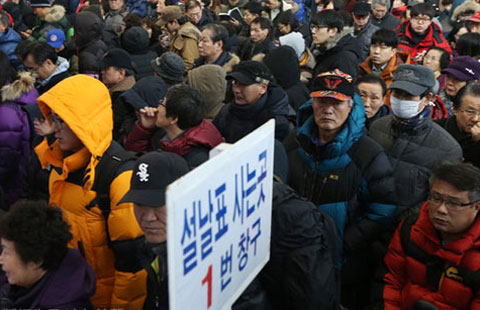
 Lunar New Year tickets run hot in South Korea
Lunar New Year tickets run hot in South Korea
Most Viewed
Editor's Picks

|

|

|

|

|
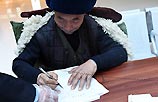
|
Today's Top News
Turkey to help in foiling suspects from Xinjiang
Japan unveils record defense budget
HK halts investment program
China unifies pension system
Lingerie not focus of Victoria's Secret in China
China's ban on US chicken could cost millions
SelectUSA round 2 gears up
New book on China-US relations published
US Weekly

|

|
